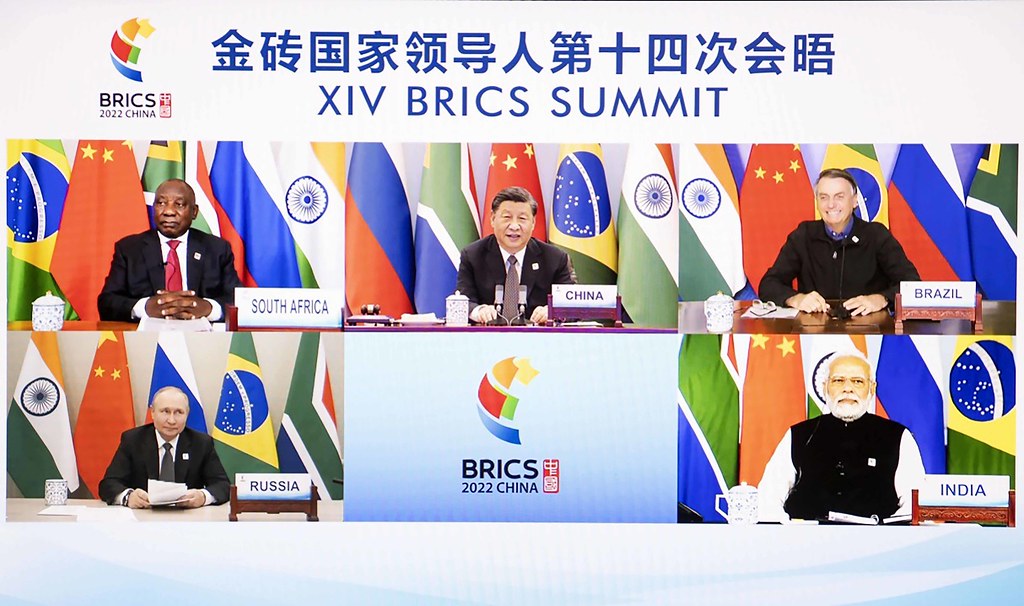 2022 BRICS Summit. CC Image courtesy of GovernmentZA on Openverse.
2022 BRICS Summit. CC Image courtesy of GovernmentZA on Openverse.
Minimizing Sino-Russian Influence in BRICS
With the upcoming BRICS Summit in Johannesburg, South Africa finds itself at a crossroads—disinvite Vladimir Putin and uphold international law or allow Putin to attend and be labeled a clear Russian ally. As China and Russia expand their influence in the Global South, as evidenced by the failure of BRICS countries to condemn Russia’s invasion of Ukraine and recent talks of BRICS enlargement, South Africa’s loyalty is being tested. To counter growing Sino-Russian influence, the U.S. should offer incentives to countries in the Global South, demonstrate the benefits of a U.S. relationship over one with China and Russia, and show its interest in multilateral relations to motivate South Africa, Brazil, and India to stray from Russia and China and ultimately strengthen the U.S.’ relations and position in the global arena.
BRICS began as an economic community of countries deemed to have the world’s leading emerging markets and growth rates. Yet, over time it has advanced to resemble an institution with political interests and strong alliances, which aim to reduce reliance on Global North economic decision-making. From August 22-24, 2023, the fifteenth annual BRICS Summit will occur. However, the International Criminal Court (ICC) has issued arrest charges against Putin, forcing South Africa to decide whether its loyalty lies with BRICS leaders Russia and China or the U.S. and the West.
The rising Sino-Russian influence in BRICS has raised concerns for the U.S., especially regarding countries’ stances on the war in Ukraine and discussions of BRICS enlargement. There has been limited to no condemnation of Russia’s invasion of Ukraine by BRICS countries. This poses a concern to the West, as efforts to counter Russian aggression, such as sanctions, are most effective when imposed collectively. Similarly, with twenty formal and informal membership applications, many countries are interested in joining BRICS, which allows Sino-Russian influence to continue to grow in the Global South without a more attractive alternative. Prospective countries hope to gain greater independence over economic and development-oriented initiatives and counter Global North-dominated institutions.
Given these concerns, the U.S. and the European Union (EU) have plans to win back current and prospective BRICS countries. The EU’s strategy seeks to attract Global South countries, such as Brazil, to cooperate through soft power initiatives that target energy, migration, and economic development. The U.S. has instituted similar policies such as vaccine distribution initiatives with the COVID-19 pandemic, and the U.S. and Group of Seven’s (G7) Partnership for Global Infrastructure and Investment, focused on climate and energy, digital infrastructure, health, and gender equality. However, the U.S. must tailor these tactics to Brazil, South Africa, and India, along with other countries falling to Sino-Russian influence, to secure strong relations.
The U.S. can also offer transparent ethical economic investment and security deals to make Chinese materialistic interests apparent and entice countries to swing toward the U.S. In 2016, the Philippines switched from supporting China to the U.S. after witnessing the failures of the Belt and Road Initiative and increased militaristic aggression in the South China Sea. The U.S. offered the Philippines defense agreements and strong diplomatic relations with itself and the AUKUS (Australia, United Kingdom, and United States) security pact. By making Chinese self-interest apparent and providing alternative deals, the U.S. can better strengthen its own relations and motivate countries to weaken ties with China and Russia.
However, the U.S. must tread carefully when aiming to strengthen its relations, and approach diplomatic conversations with a strong focus on multilateralism. Many countries do not want to choose between China and the U.S., and it will be in the U.S.’ favor to reduce its emphasis on competition, and focus on what makes a partnership appealing to a target country. Historically, when the U.S. put pressure on states to switch camps from China to the U.S., such as with Cambodia during the Cold War, it resulted in greater Western resentment. Thus, the U.S. must emphasize cooperation when approaching conversations with Brazil, South Africa, and India.
South Africa is faced with a choice to decide where its loyalty lies, but may see that choice as false, resenting the pressure to reject what it sees as an important relationship. The upcoming BRICS Summit will determine more than just South Africa’s dedication to BRICS, but it will pave the future for the advancement of Sino-Russian influence in the international order. To counter these risks, it is time for the U.S. to prioritize incentives over consequences. The U.S. must strengthen its relations with countries in the Sino-Russian sphere of influence and emphasize its loyalty to relationship-building over materialistic economic gains to win the long game.
Photo Licensed under Creative Commons Attribution-NoDerivs 2.0 Generic (CC BY-NC 2.0).






